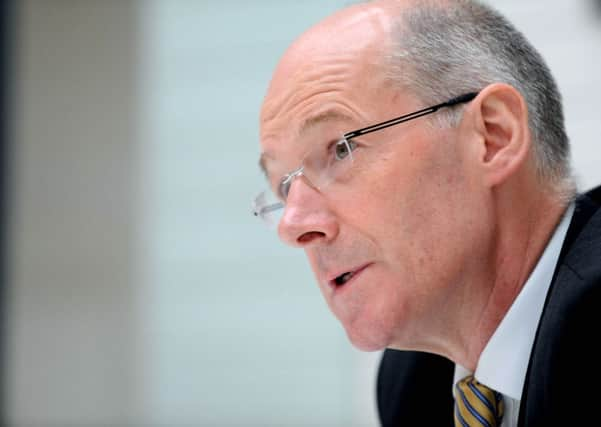John Swinney to propose tax rates in draft budget


The draft budget, detailing the Scottish Government’s spending proposals, will be presented to MSPs at Holyrood by John Swinney on Thursday.
It will be the first to include details of the new taxation and borrowing powers transferred to the Scottish Parliament through the Scotland Act 2012 and to set out tax receipts forecasts.
Advertisement
Hide AdAdvertisement
Hide AdMr Swinney will propose the first rates for two devolved taxes, the land and buildings transaction tax - which replaces the existing UK stamp duty land tax paid when buying property over a certain value - and the Scottish landfill tax, both of which are due to come into effect on April 1 next year.
He will set out the tax-free threshold below which house buyers will not need to pay any tax, currently £125,000 under the stamp duty system.
The Scottish Government says the new system north of the border will be fairer as it will be more directly related to the value of the property.
The Scottish landfill tax, paid by companies and local authorities when they dispose of waste to landfill, will be extended to illegal dumping, which is not currently covered by the UK tax.
The two taxes are expected to bring in between £500 and £600 million each year, with Scotland’s block grant from the UK Treasury adjusted to reflect the transfer of tax receipts to Holyrood.
Scottish ministers will also have the power to borrow about £300 million annually to boost capital investment.
Mr Swinney said: “For the first time in over 300 years aspects of tax and borrowing can begin to be aligned to Scotland’s distinct needs and underpin the values of fairness and solidarity.
“These new powers give us the opportunity to reinvigorate the principles set out by Adam Smith - that taxes should be proportionate to the ability to pay, that there must be certainty, convenience, for the taxpayer and efficiency of tax collection.
Advertisement
Hide AdAdvertisement
Hide Ad“We will use new rules on tax avoidance to make sure those that should pay tax do pay tax.
“Our decision to replace the unfair and outdated system of stamp duty with a more progressive tax more closely linked to people’s ability to afford the property they want demonstrates the importance of having tax policy for Scotland made in Scotland.”
The Finance Secretary said the new powers were a step forward but reiterated the SNP administration’s position that Holyrood should be responsible for “the full range of taxes levied in Scotland”.
He added: “It is only with full fiscal responsibility that we can build a stronger, more successful economy.
“It remains to be seen whether Westminster is now ready to look again at this as part of the promised increased transfer of tax powers following the independence referendum.”
The new body Revenue Scotland will be responsible for collecting and managing the two new taxes.
The Scotland Act 2012 also brought in a Scottish rate of income tax which will take effect from April 2016. Scottish ministers will be able to vary that rate but it will continue to be collected by HMRC.